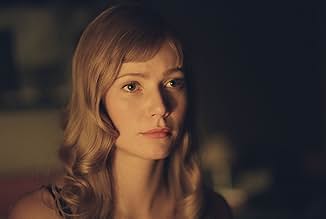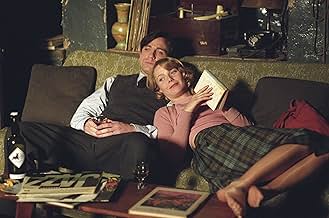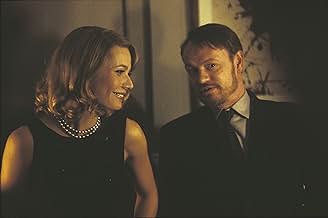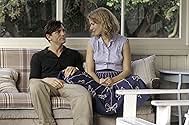Story of the relationship between poets Edward James "Ted" Hughes and Sylvia Plath.Story of the relationship between poets Edward James "Ted" Hughes and Sylvia Plath.Story of the relationship between poets Edward James "Ted" Hughes and Sylvia Plath.
- Awards
- 1 win total
- Director
- Writer
- All cast & crew
- Production, box office & more at IMDbPro
Featured reviews
When I rented this movie, I thought it would be about Sylvia's entire life, or at least starting from her days at Smith College. I didn't realize that her marriage with Ted Hughes would be the entire storyline. I think this movie would've been better had they shown more about Plath's life BEFORE Ted Hughes. For people who don't really know much about Plath and her poetry, understanding her life before Hughes would've made the film much more substantial. The audience has to realize that Plath led a very, very hard mental life even before she met Hughes, and her ideas for her poetry and 'The Bell Jar' mostly originated from her bachelorette days. She never recovered from her depression as a young woman and it branched out still as she married Hughes. Without understanding Plath from the beginning hinders the audience from understanding Plath at all.
I feel like the movie only told half the story. Plath's mind was beautiful, colorful, and brilliant. It wasn't just about the jealousy, depression, and paranoia. Putting her works on the back burner really took away most of this movie. I would've liked to see more narration by Plath and giving us an insight into her mind, the way her unabridged journals do. However, I really enjoyed the dialogue of this movie; the lines were poetic and beautiful.
Unfortunately, I am still waiting for a better Sylvia Plath movie. I recommend people to read 'The Bell Jar' and 'Ariel' before or after seeing this movie though.
I feel like the movie only told half the story. Plath's mind was beautiful, colorful, and brilliant. It wasn't just about the jealousy, depression, and paranoia. Putting her works on the back burner really took away most of this movie. I would've liked to see more narration by Plath and giving us an insight into her mind, the way her unabridged journals do. However, I really enjoyed the dialogue of this movie; the lines were poetic and beautiful.
Unfortunately, I am still waiting for a better Sylvia Plath movie. I recommend people to read 'The Bell Jar' and 'Ariel' before or after seeing this movie though.
It's 1956 Cambridge, England. American student Sylvia Plath (Gwyneth Paltrow) is dismissed by the high-minded poetry review. She is taken with fellow student Edward Ted Hughes (Daniel Craig)'s poems. They eventually get married. He has many female fans and she suspects his infidelity. They have two children. She struggles to write under successful Ted's overwhelming shadow. She falls into depression and eventually commits suicide in 1963.
It's a downbeat biopic that bothers on old-fashion melodrama. Paltrow is lovely but I figured Plath would be more fragile even before her breakdown. Daniel Craig has the prerequisite charisma. The movie is very flat. It is unable to elevate the material into something more dramatic. This is a long drawn out character study that isn't terribly interesting.
It's a downbeat biopic that bothers on old-fashion melodrama. Paltrow is lovely but I figured Plath would be more fragile even before her breakdown. Daniel Craig has the prerequisite charisma. The movie is very flat. It is unable to elevate the material into something more dramatic. This is a long drawn out character study that isn't terribly interesting.
"Sylvia" is not quite just a slow, straightforward bio-pic of poet Sylvia Plath. While screenwriter John Brownlow has a long background in TV documentaries, director Christine Jeffs has previously made a young woman's mental disquiet dreamily visual in the superb New Zealand film "Rain."
She has her "Rain" cinematographer John Toon bathe the entire film in a nostalgia-tinged amber glow, like the extended flashbacks to the young lovers in the Australian film "Innocence." I think the point is to determinedly place Plath and her husband poet Ted Hughes into their specific time at the cusp before "The Feminine Mystique" put a name to Plath's frustrations and contradictions as a Fulbright scholar - experimental poet turned wife and mother who ultimately turned on herself. ("Mona Lisa's Smile" with Julia Roberts will evidently be dealing with a parallel time and place in a much more Hollywood interpretation.)
As played alternatively languid and aggressive by Gwyneth Paltrow and a Byronic Daniel Craig, they are an actively sensual couple, but notably not Bohemian. They are part of an intellectual but not counter-cultural set. While they are competing for editors' accolades and print space, she's setting her hair, arranging her pearls and cleaning house, like a proper Smith graduate of the time who is perfectly at home visiting her Boston mother (played by real-life mom Blythe Danner) and amidst the books of her late bee scholar father (My friend the PhD in English tells me that the original film title of "The Bee-Keeper's Daughter" would have been fraught with much more significance about Plath's obsessions.)
Hughes celebrates his first big break by asking her to marry him and kids follow one after the other; when they need money he looks to write a children's series for the BBC. Yes, she gets more and more difficult and paranoid, but he is having affairs (and another child) as he attracts more fawning women acolytes.
An earlier suicide effort is referenced a couple of times yet her increasingly heightened mental imbalance as shown here could be post-partum depressions or a Laingian response that insanity is the only rational response to an insane, unfair world. (The film does not seem to side with her loyalist cult which Margaret Atwood satirizes in "The Blind Assassin").
It is always difficult to show a writer at work, but I would have liked to hear more of her poetry than a few passing sentences.
Gabriel Yared's music is lovely and unsentimental.
She has her "Rain" cinematographer John Toon bathe the entire film in a nostalgia-tinged amber glow, like the extended flashbacks to the young lovers in the Australian film "Innocence." I think the point is to determinedly place Plath and her husband poet Ted Hughes into their specific time at the cusp before "The Feminine Mystique" put a name to Plath's frustrations and contradictions as a Fulbright scholar - experimental poet turned wife and mother who ultimately turned on herself. ("Mona Lisa's Smile" with Julia Roberts will evidently be dealing with a parallel time and place in a much more Hollywood interpretation.)
As played alternatively languid and aggressive by Gwyneth Paltrow and a Byronic Daniel Craig, they are an actively sensual couple, but notably not Bohemian. They are part of an intellectual but not counter-cultural set. While they are competing for editors' accolades and print space, she's setting her hair, arranging her pearls and cleaning house, like a proper Smith graduate of the time who is perfectly at home visiting her Boston mother (played by real-life mom Blythe Danner) and amidst the books of her late bee scholar father (My friend the PhD in English tells me that the original film title of "The Bee-Keeper's Daughter" would have been fraught with much more significance about Plath's obsessions.)
Hughes celebrates his first big break by asking her to marry him and kids follow one after the other; when they need money he looks to write a children's series for the BBC. Yes, she gets more and more difficult and paranoid, but he is having affairs (and another child) as he attracts more fawning women acolytes.
An earlier suicide effort is referenced a couple of times yet her increasingly heightened mental imbalance as shown here could be post-partum depressions or a Laingian response that insanity is the only rational response to an insane, unfair world. (The film does not seem to side with her loyalist cult which Margaret Atwood satirizes in "The Blind Assassin").
It is always difficult to show a writer at work, but I would have liked to hear more of her poetry than a few passing sentences.
Gabriel Yared's music is lovely and unsentimental.
After viewing the film on Sylvia Plath, I felt a need to read about this poet and find out exactly what Hollywood did with it. As usual, Hollywood transformed a person's life into what an audience would want to be amused by. Mr. Hughes is personified as a womanizer and adulterer, the later of which may be true. After reading two biographies of Ms. Plath by Linda W. Wagner-Martin and Anne Stevenson and of course having studied Ms. Plath's poetry, I feel that the film, albeit entertaining does not depict her actual identity. It does a marginal account of her life, or part of her life. As any human being, Ms. Plath suffered from many demons. If you ascribe to an astrological standpoint (as Mr. and Mrs. Hughes did) you will find that Sylvia was doomed by her astrological sign, Scorpio. Those of you who are Scorpios know that there is a dark side to this sign. She set her expectations too high of most things and considered the failure of loyalty from her friends and family detrimental. Her experiences with depression only added fuel to the flame. Had she lived in modern times, maybe the newer therapies could have helped her. Depression is a severe affliction and may make a great poet, but for everyday living it can render a person helpless. It can make one helpless with dealing with marriage and children, life in general, and one's occupation. Sylvia Plath was a victim of her depression, her personality overreacting to life and her relationships. Unfortunately, she could not work her way through her inner problems and suffered the result of her mental blockage. Fortunately, for her children, they were unharmed by her mental illness and subsequent actions, and were eventually raised by their father. No one is to blame... no one is superhuman. If standards are set too high for anyone, as Sylvia set for herself, anyone is doomed to failure. We do have her poetry and novel(s) to see her inner self, which no film can properly depict.
I am pretty familiar with Plath's story, and am also a keen fan of her work, which i think contributed to my hesitancy in seeing the film. I did not have high hopes for this film at all, and honestly, I have to say that I was pleasantly surprised.
My main criticisms:
I found it hard to get past the whole 'Oooh look it's Gwyneth Paltrow as Sylvia Plath'. Someone who isn't famous on a global scale would have been more credible.
The whole premise of the film hinges on the deep passionate relationship of Plath and Hughes, yet I never really felt convinced by it. The relationship came across as quite two dimensional, and even pretty one sided on the part of Paltrow/Plath. Instead of being portrayed as an emotionally fragile woman driven to the edge by Hughes' constant philandering and ultimate betrayal, Plath actually seemed to come across as being deeply insecure and neurotic, constantly suffering from extreme PMT, and overreacting every time she saw Hughes even talking to another woman, rather than having genuine reason to suspect his infidelity.
There were a couple of key dramatic moments (such as after they have made love for the first time, and when they are out in the boat together) that felt very hammy, so disrupted the momentum of the piece.
The score is just awful. Totally totally overwrought, over the top, too loud and too much of it. Plus, as Paltrow/Plath really starts to lose her mind there is an almost constant sound of howling wind in the backgroud. Again, OTT. Less definitely would have been more.
HOWEVER
Ok, I complained about Paltrow above, but she really did a great job. She really is a very talented actress, and it is a shame the whole celebrity thing gets in the way. She was particularly fine in the latter stages of the film, and the sad descent into loneliness and irreversible depression was very well judged.
Likewise, Daniel Craig was very enigmatic, although I wonder whether the one sidedness of the relationship as mentioned above may have come from him.
As a whole the film was very sympathetic, and showed how hard it must have been for Hughes to live with Plath. It doesn't justify his behaviour but rather tries to show an understanding. It also evokes a sense of a time when poets were considered important.
This film stayed with me for some days after watching it, and I would recommend it. It is somewhat uneven in pace and direction, but I think Christine Jeffs is a director with talent, although her inexperience showed. But above all, it renewed my interest in both Plath and Hughes.
7/10
My main criticisms:
I found it hard to get past the whole 'Oooh look it's Gwyneth Paltrow as Sylvia Plath'. Someone who isn't famous on a global scale would have been more credible.
The whole premise of the film hinges on the deep passionate relationship of Plath and Hughes, yet I never really felt convinced by it. The relationship came across as quite two dimensional, and even pretty one sided on the part of Paltrow/Plath. Instead of being portrayed as an emotionally fragile woman driven to the edge by Hughes' constant philandering and ultimate betrayal, Plath actually seemed to come across as being deeply insecure and neurotic, constantly suffering from extreme PMT, and overreacting every time she saw Hughes even talking to another woman, rather than having genuine reason to suspect his infidelity.
There were a couple of key dramatic moments (such as after they have made love for the first time, and when they are out in the boat together) that felt very hammy, so disrupted the momentum of the piece.
The score is just awful. Totally totally overwrought, over the top, too loud and too much of it. Plus, as Paltrow/Plath really starts to lose her mind there is an almost constant sound of howling wind in the backgroud. Again, OTT. Less definitely would have been more.
HOWEVER
Ok, I complained about Paltrow above, but she really did a great job. She really is a very talented actress, and it is a shame the whole celebrity thing gets in the way. She was particularly fine in the latter stages of the film, and the sad descent into loneliness and irreversible depression was very well judged.
Likewise, Daniel Craig was very enigmatic, although I wonder whether the one sidedness of the relationship as mentioned above may have come from him.
As a whole the film was very sympathetic, and showed how hard it must have been for Hughes to live with Plath. It doesn't justify his behaviour but rather tries to show an understanding. It also evokes a sense of a time when poets were considered important.
This film stayed with me for some days after watching it, and I would recommend it. It is somewhat uneven in pace and direction, but I think Christine Jeffs is a director with talent, although her inexperience showed. But above all, it renewed my interest in both Plath and Hughes.
7/10
Did you know
- TriviaFrieda Hughes, Sylvia Plath's daughter and literary executor, didn't allow the producers to access to her mother's poetry. She also publicly denounced the project in a published poem of her own.
- GoofsWhen Ted and Sylvia are in bed together and she is discussing her suicide attempt, you can clearly see Daniel Craig's tattoo through the make up on his shoulder and Gwyneth Paltrow's hair net to which her wig is attached.
- Quotes
Sylvia: [to Ted, after making love] We're not even two people. Even before we met, we were just these two halves, walking around with big gaping holes in the shape like the other person. And when we found each other we were finally whole. And then it was as if we couldn't stand being happy so we ripped ourselves in half again.
- How long is Sylvia?Powered by Alexa
Details
Box office
- Budget
- £7,000,000 (estimated)
- Gross US & Canada
- $1,315,498
- Opening weekend US & Canada
- $58,940
- Oct 19, 2003
- Gross worldwide
- $2,917,393
- Runtime
- 1h 40m(100 min)
- Color
- Sound mix
- Aspect ratio
- 2.35 : 1
Contribute to this page
Suggest an edit or add missing content







































